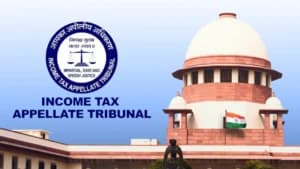The Supreme Court has ruled that if a person is arrested with a warrant, there is no need to give separate grounds for the arrest. The Court explained that the warrant itself includes all the reasons for the arrest and fulfills the legal requirement under Article 22(1) of the Constitution.
“If a person is arrested on a warrant, the grounds for reasons for the arrest is the warrant itself; if the warrant is read over to him, that is sufficient compliance with the requirement that he should be informed of the grounds for his arrest.” – Supreme Court
Read also: Supreme Court Seeks Centre's Response on Suggestions to Reform Sex Education and Real-Time
A bench of Justices J.B. Pardiwala and R. Mahadevan delivered this decision while hearing an appeal. The case was about a man who challenged his son’s arrest, arguing that it violated Article 22(1) of the Constitution because the grounds of arrest were not provided. After the trial court and the High Court dismissed his plea, he moved to the Supreme Court.
Justice Pardiwala referred to the Vihaan Kumar v. State of Haryana, (SC) 169 case and explained that Article 22(1) applies when a person is arrested without a warrant. When a warrant is used, it already includes the necessary information, such as the charges, reasons (like avoiding trial or threatening evidence), and the identity of the accused.
Read also: Supreme Court: Referring to Trial Court as "Lower Court" is Against the Constitution
“If he is arrested without a warrant, he must be told why he has been arrested. If he is arrested for committing an offence, he must be told that he has committed a certain offence for which he would be placed on trial. In order to inform him that he has committed a certain offence, he must be told of the acts done by him which amounts to the offence.” – Supreme Court
In the Vihaan Kumar judgment, Justice Abhay S Oka clearly stated:
“When a person is arrested without a warrant, and the grounds of arrest are not informed to him as soon as may be after the arrest, it will amount to a violation of his fundamental right guaranteed under Article 21 as well.”
Read also: Supreme Court Directs Recount of Supreme Court Bar Association Election Votes Amid Complaints
The Court dismissed the appeal and reinforced these key points:
- Informing the grounds of arrest is mandatory under Article 22(1) but only when there is no warrant.
- When arrested on a warrant, the details in the warrant satisfy this requirement.
- The mode of informing the grounds must be clear and meaningful to serve its purpose.
- Failure to inform grounds after arrest without a warrant violates both Article 22(1) and Article 21 and makes the arrest illegal.
- Police must prove they informed the arrestee of the grounds if challenged in court.
- The arrestee’s family should also be informed so they can arrange legal help and release.
“On the failure to comply with the requirement of informing grounds of arrest as soon as may be after the arrest, the arrest is vitiated. Once the arrest is held to be vitiated, the person arrested cannot remain in custody even for a second.” – Supreme Court
Case Title: KASIREDDY UPENDER REDDY Versus STATE OF ANDHRA PRADESH AND ORS.
Appearance:
For Petitioner(s) : Mr. Mahesh Jethmalani, Sr. Adv. Mr. Navin Pahwa, Sr. Adv. Mr. Ponnavolu Sudhakar Reddy, Sr. Adv. Mr. Ramesh Allanki, Adv. Ms. Aruna Gupta, Adv. Mr. Shriharsha Peechara, Adv. Mr. Syed Ahmad Naqvi, Adv. Mr. Alabhya Dhamija, AOR Mr. Shreevardhan Dhoot, Adv. Mr. M. Bala Krishna, Adv. Mr. T. Vijaybhaskar Reddy, Adv. Mr. Yash Gupta, Adv. Mr. Krishna Kumar Singh, Adv. Ms. Serena Jethmalani, Adv. Mr. Ajay Awasthi, Adv. Ms. Mugdha Pande, Adv. Mr. Vaibhav Thaledi, Adv. Mr. Yashaswi SK Chocksey, Adv. Mr. Krishna Kumar Singh, AOR
For Respondent(s): Mr. Sidharth Luthra, Sr. Adv. Mr. Siddharth Aggarwal, Sr. Adv. Mr. Guntur Pramod Kumar, AOR Ms. Prerna Singh, Adv. Mr. Samarth Krishan Luthra, Adv. Ms. Rajni Gupta, Adv.















